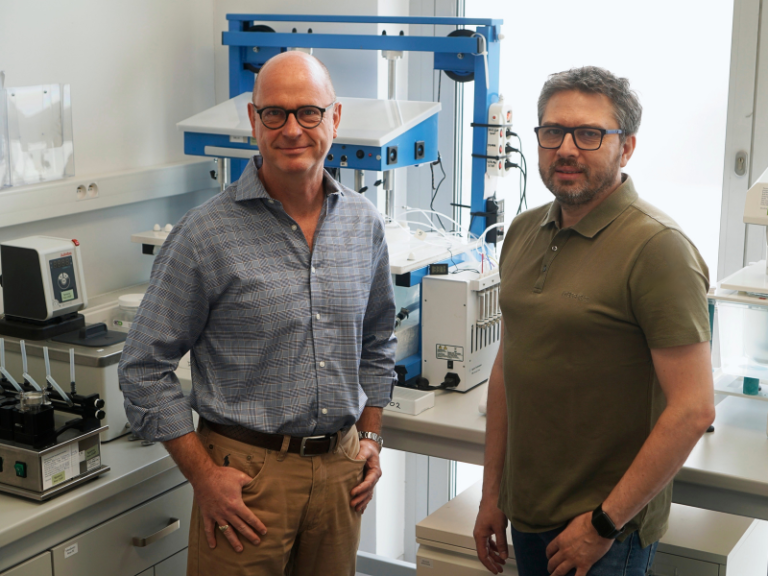Wrocławski Biotts to innowacyjna spółka biofarmaceutyczna, specjalizująca się w autorskich nośnikach, zwiększających biodostępność substancji czynnych, oraz recepturach farmaceutyków. Przełomowa technologia firmy umożliwia aplikację leków przez skórę metodą transdermalną, pozwalającą zredukować negatywne skutki uboczne leków doustnych i dożylnych, zmniejszyć ich dawki i zwiększyć skuteczność substancji aktywnych. System transdermalny Biotts może być wykorzystany do aplikacji powszechnie stosowanych leków przeciwcukrzycowych, onkologicznych, przeciwzapalnych czy przeciwbólowych. Teraz Biotts jako pierwszy na świecie skutecznie podał peptydy: semaglutyd oraz liraglutyd przez skórę, w formie transdermalnej.
Patent Biotts szansą dla big pharmy
W przypadku podania przez Biotts semaglutydu przez skórę w wygodnej dla pacjentów formie transdermalnej, Biotts otrzymał znacznie wyższe wyniki biodostępności substancji czynnych leku w porównaniu do formy doustnej. To ważne o tyle, że wchłanialność tej ostatniej jest na bardzo niskim poziomie oraz wiąże się z wieloma ograniczeniami. Dla koncernów farmaceutycznych forma transdermalna semaglutydu oznaczać więc ma ogromne oszczędności ze względu na redukcję ilości używanej substancji leczniczej. Wrocławska spółka planuje przeprowadzić pierwsze badania kliniczne na pacjentach z podaniem semaglutydu już w 2024 roku.
Semaglutyd to najnowsza gwiazda globalnej medycyny – jest substancją wykorzystywaną w leczeniu cukrzycy typu 2, otyłości i insulinooporności. Pobudza wydzielanie insuliny, redukuje produkcję glukagonu i pomaga regulować poziom cukru we krwi. Od niedawna trwają również badania kliniczne nad zastosowaniem leku w leczeniu Alzheimera. Światowy boom sprzedaży semaglutydu związany jest z jego skutecznością w redukcji masy ciała. W USA substancja szybko została ogłoszona fenomenem wśród celebrytów i w mediach społecznościowych, co znacząco przyczyniło się do zwiększonego popytu na jej globalną produkcję. Wg dostępnych informacji z rynku Novo Nordisk – wiodący producent insuliny i popularnych leków diabetologicznych bazujących na semaglutydzie, jak Ozempic i Wegovy – zanotował w 2022 r. wzrost sprzedaży semaglutydu o 93%. Bezprecedensowa sprzedaż byłaby jeszcze większa, gdyby nie ograniczenia wynikające z możliwości produkcyjnych substancji. Pod koniec czerwca Novo Nordisk ogłosił zakończenie testów semaglutydu w tabletkach o zwiększonej dawce 25 mg i 50 mg – w odróżnieniu do 1 mg w Ozempicu, 2,4 mg w Wegovy i 14 mg w Rybelsus – prowadzących do utraty nawet 15% masy ciała. Duński producent oczekuje na zatwierdzenie ich przez europejskich i amerykańskich regulatorów jeszcze w tym roku. Jak podaje Reuters, analitycy branżowi przewidują, że rynek semaglutydu i podobnych leków osiągnie wartość 100 mld USD rocznej sprzedaży w ciągu tej dekady.
Pacjenci z cukrzycą testują plastry Biotts
Obecnie trwają także zaawansowane badania kliniczne rozwiązania Biotts na pacjentach z cukrzycą typu 2. Pierwsza grupa pacjentów testowała nośniki MTC-Y z dapagliflozyną, obniżającą stężenie glukozy we krwi poprzez przyczynianie się do zwiększonego wydalania przez nerki glukozy z moczem. Nośniki MTC-Y z dapagliflozyną to specjalne plastry na skórę o szybkiej i głębokiej wchłanialności w jakości GMP, stworzone przez Biotts do pierwszej serii badań klinicznych systemów transdermalnych, umożliwiające transport przez skórę do krwiobiegu
substancji przeciwcukrzycowych. Forma transdermalna umożliwia lekom szybką penetrację skóry bez jej podrażniania. Planowane zakończenie badań klinicznych fazy 1A wraz z częścią analityczną to koniec trzeciego kwartału tego roku.
“Badania kliniczne fazy 1A mają przede wszystkim udowodnić efektywność i bezpieczeństwo nośnika MTC-Y opatentowanego przez Biotts. Obiecujące badania przedkliniczne na większych cząsteczkach takich jak semaglutyd, w połączeniu z wkrótce potwierdzoną przez nas skutecznością stosowania nośnika, otwierają przed nami drogę do zrewolucjonizowania leczenia chorób przewlekłych.”
– podkreśla dr Paweł Biernat, CTO w Biotts
“Badanie kliniczne na ludziach może zakończyć się historycznym sukcesem, który otworzy nowe możliwości dla przemysłu farmaceutycznego, producentów leków i zmieni życie tysięcy pacjentów. Innowacyjna technologia Biotts nie tylko obniży koszty leczenia, ale zapewni milionom pacjentów możliwość przyjmowania leków w komfortowych warunkach, zastępując np. doustne formy podawania leków, obciążające układ pokarmowy, czy bolesne zastrzyki. Takie rozwiązanie umożliwi przełom na rynku leków przeciw cukrzycy typu 2, który cechuje się wysoką dynamiką wzrostu i według szacunków będzie wart nawet 61,2 mld USD do 2024 r.”
– dodaje Jan Hendriks, prezes Biotts
Wielkimi krokami do komercjalizacji
Z tysięcy leków obecnie zatwierdzonych przez amerykańskiego regulatora FDA mniej niż 30 jest zatwierdzonych do podawania przezskórnego. Mimo to, według badań wartość rynku systemów transdermalnych dostarczania leków wyniesie 8.7 mld USD do 2027 r., ze średnim tempem wzrostu 6.39% (CAGR) w perspektywie 2021-2027. Jak dotąd skuteczne przezskórne dostarczanie leku było osiągane tylko przy użyciu małych cząsteczek (<500 Da). Rozwój technologii MTC-Y, opracowanej przez wrocławski startup, skutecznie usunął te ograniczenia.
Metoda transdermalna Biotts pozwala na przezskórne dostarczanie także większych cząsteczek (do 6000 Da, chociaż prawdziwe limity tej technologii nie są jeszcze znane), większą kontrolę uwalnianych do organizmu substancji aktywnych i zmniejszenie częstotliwości podawania – a tym samym poprawę jakości życia pacjentów. Aby przyspieszyć proces komercjalizacji, spółka przekształciła swoje bostońskie biuro w oddział Biotts US i rozpoczęła współpracę z amerykańskimi ekspertami z branży biofarmaceutycznej.
“Semaglutyd jest niezwykle istotnym rynkiem, którego warto się podjąć – prognozuje się, że wartość rynku semaglutydu w USA wyniesie 65 mld USD do 2030 r., a szacowana wartość rynku globalnego wzrośnie do 100 mld USD. Biotts, dzięki swojej transdermalnej formule semaglutydu, zajmuje dobrą pozycję do generowania znaczących przychodów już na wczesnym etapie, opierając się na skróconej ścieżce zatwierdzenia regulacyjnego. Jesteśmy gotowi do współpracy z firmami farmaceutycznymi w zakresie rozwoju i komercjalizacji jedynego na świecie nieinwazyjnego preparatu transdermalnego z semaglutydem.”
– wskazuje Devrim Aran, prezes Biotts US




